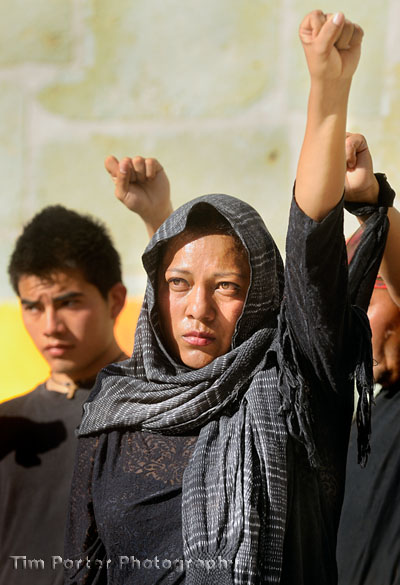
A few days ago the Wall Street Journal published a lengthy story about the ominous criminal, political and social conditions in Mexico that have combined to degrade civil society in many parts of the country to the brink of public disorder.
Fueling this collapse are two evils — the ravenous appetite of the narco cartels for control of the border, of law enforcement and of the proverbial hearts and minds of Mexico’s impoverished citizens; and the endemic, ubiquitous and persistent corruption of government on all levels.
The Journal piece focused on the implications for the United States should the rule of law fail in Mexico. It quoted a high-ranking official in the country’s current ruling party, the PAN:
“The Mexican state is in danger. We are not yet a failed state, but if we don’t take action soon, we will become one very soon.”
For me, it’s more personal. I have good friends — Mexicans and Americans — who live there. I have a house in Oaxaca, Mexico’s most beautiful state and also its poorest. I have seen the country’s working people, through resilient desire and endless effort, carve out good lives for themselves amid a system that favors the wealthy, the connected and the corrupt. And, sadly, I have witnessed well-off people I considered friends express disdain for the poor and for the creation of a society of laws. They are, after all, the beneficiaries of the current system.
I don’t cry easily. The scar tissue laid on during 20 years of daily journalism usually keeps the tears in check. But these days Mexico makes me cry.
I cried right there as the video played. A woman next to me, dressed in the traditional apron of a southern Mexican housewife, saw me, an aging gringo journalist laden with camera gear, and said, “Que triste. Que triste.” How sad. How sad.
A few days later, local thugs — some say off-duty cops — opened fire on a protest march, killing freelance American journalist Brad Will. (Here’s a picture — not mine — of the shooting.)
The resulting international outrage — far beyond any that accompanied the earlier deaths of dozens of Oaxacans — prompted the federal government to send troops into the city restore order.
More than two years later, nothing has changed for the better in Oaxaca. The economy, highly dependent on tourism, has yet to recover. The governor who attacked the striking teachers remains in power. The leaders of the strike are jailed. The killers of Brad Will are free. (The photo at the top of the post is from an anniversary march in Oaxaca’s main square two years after the 2006 attacks.)
Multiply this one incident — a strike, a shooting, a disregard by the authorities for even the facade of justice — throughout the country and amplify it along the drug-trafficking lanes in the border cities and you begin to get grasp of the severity of the challenges Mexico faces. Here’s one fact: 6,000 people were killed in Mexico last year in drug-related violence. The U.S. dead in Iraq for six years of war is 4,200.
Perhaps you wonder why you should care about what happens in Mexico. After all, aren’t the beaches in Baja still beautiful and the pina coladas in Cancun just as tasty? De veras, they are. But Mexico is much more than an American playground.
First, it is also, as the Journal points out, the largest U.S. trading partner and with our economy already on life support we don’t need to lose our best customer.
Second, if you think having more than 4 million undocumented Mexican immigrants living in the United States is troublesome, then imagine the immigration pressure on the border should the Mexican government collapse. Says the Journal:
“It has 100 million people on the southern doorstep of the U.S., meaning any serious instability would flood the U.S. with refugees.”
Finally, there is morality. What is happening in Mexico is simply wrong. It is wrong to oppress the poor so the wealthy can prosper. It is wrong to deny people jobs because they belong to an opposing political party. It is wrong to glorify crime and drug use. And, it is wrong to kill journalists. (Read this report, or this one, or this one from the Committee to Protect Journalists.)
Poor Mexico. I cry for you. I wish I could do more.
